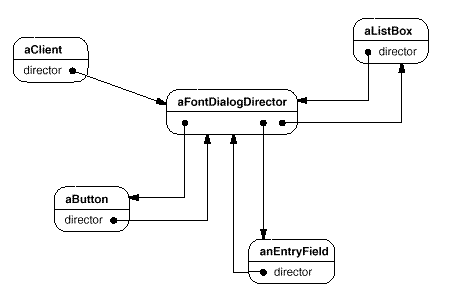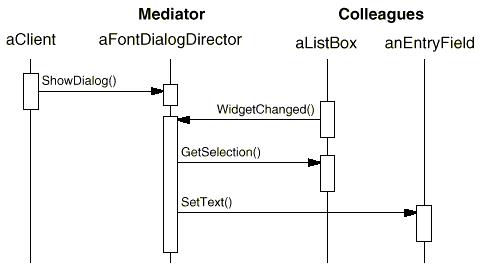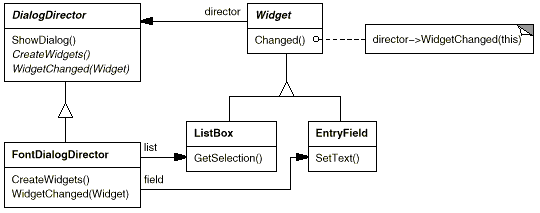Object-oriented design encourages the distribution of behavior among objects. Such distribution can result in an object structure with many connections between objects; in the worst case, every object ends up knowing about every other. Though partitioning a system into many objects generally enhances reusability, proliferating interconnections tend to reduce it again. Many interconnections make it less likely that an object can work without the support of others—the system acts as though it were monolithic. Moreover, it can be difficult to change the system's behavior in any significant way, since behavior is distributed among many objects. Thus it may be necessary to define many subclasses to customize the system's behavior.
As an example, consider the implementation of dialog boxes in a graphical user interface. A dialog box uses a window to present a collection of widgets such as buttons, menus, and entry fields. Often there are dependencies between the widgets in the dialog. A button gets disabled when a certain entry field is empty. Selecting an entry in a list of choices called a list box might change the contents of an entry field. Conversely, typing text into the entry field might automatically select one or more corresponding entries in the list box. Once text appears in the entry field, other buttons may become enabled that let the user do something with the text, such as changing or deleting the thing to which it refers. Different dialog boxes will have different dependencies between widgets. So even though dialogs display the same kinds of widgets, they can't simply reuse stock widget classes; they have to be customized to reflect dialog-specific dependencies. Customizing them individually by subclassing is tedious, since many classes are involved. Avoid these problems by encapsulating collective behavior in a separate Mediator object, which is responsible for controlling and coordinating the interactions of a group of objects. The Mediator serves as an intermediary that keeps objects in the group from referring to each other explicitly. The objects only know the Mediator, thereby reducing the number of interconnections. For example, FontDialogDirector can be the Mediator between the widgets in a dialog box. A FontDialogDirector object knows the widgets in a dialog and coordinates their interaction. It acts as a hub of communication for widgets:


